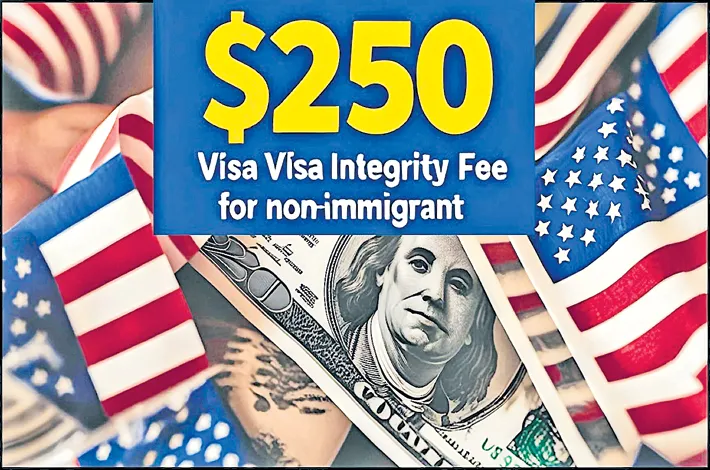A Bolt From the Blue!
16-07-2025 12:00:00 AM

Simple Vishwakarma Mumbai
In a major development that could impact thousands of Indian students and travellers, the United States has introduced a $250 Visa Integrity Fee for nearly all non-immigrant visa categories, including student (F/M), tourist (B-1/B-2), work (H-1B), and exchange (J) visas. On 4 July, 2025, the new fee, which was a component of the One Big Beautiful Bill Act that President Donald Trump signed into law, went into force.
The charge will be collected at the time of visa approval and is applicable to each given visa, according to Fragomen reports. In Indian currency, this translates to an additional Rs 21,400 on top of the existing visa cost, effectively doubling what applicants currently pay for a US visa.
The US Department of Homeland Security (DHS) will collect the fee and has been given the authority to increase the amount in the future. In order to account for inflation, the Visa Integrity Fee will begin to rise annually in 2026 and be correlated with the Consumer Price Index (CPI).
Refund conditions are strict, even though the DHS considers the new cost to be comparable to a security deposit. The charge is reimbursed only in the event of applicants adhering completely to visa conditions, such as leaving the country in time or undergoing proper change of status in the U.S. Any form of violation, like overstaying on a visa or status change without notice, would disqualify the applicant from receiving a refund.
Officials say the goal is to guarantee that visa holders adhere to U.S. immigration rules. However, given the Trump administration’s general emphasis on enforcement-driven policies, many see the action as the most recent attempt to strengthen enforcement of legitimate immigration. It should be pointed out that this surcharge does not exist for diplomatic or government visa applicants under the A and G categories.
On condition of anonymity, a 21-year-old Indian student getting set to start classes at a U.S. institution in the autumn of 2025 stated, "We're already stretching our budget to afford tuition and living expenses." Now, this additional cost only increases the strain. Furthermore, it seems very hard to fulfil the return requirements.
"This feels more like a fine in disguise than a deposit," said Anirudh Prakash, a Pune-based final-year engineering student. There is no indication of how or when the refund will occur, even if I abide by all the guidelines. Studying in the United States seems like a huge thing these days. There are many problems and obstacles now and then.
Drop in Student Visa Approvals Raises Alarm
The new fee coincides with growing anxiety among Indian students, particularly after a noticeable dip in U.S. student visa approvals this year. According to recent data from the US State Department, only 9,906 F-1 visas were issued to Indian students between March and May 2025, a sharp 27% drop from the same period the previous year.
This decrease is far less than the 10,894 student visas that were issued during the same time period in 2022, the first full year after the pandemic. The busiest time of year for processing student visas is usually March through July, just before the start of the fall term.
Administrative hold-ups and tighter controls
The plunge in numbers is based on a variety of factors, such as administrative delays, stricter vetting of applications, and the temporary suspension of new interview slots. From May 27 to June 18, US consular posts in India suspended giving new appointments when they introduced tighter security measures.
One of the major changes was the implementation of obligatory social media background checks. Indeed, the US Embassy in New Delhi went so far as to recommend that students keep their social media accounts open to prevent delayed screening. While officials have described these checks as national security measures, many students feel uneasy about being asked to reveal their online presence.
US education is still attractive, but confidence shaken
Despite these hiccups, the United States remains one of the top destinations for Indian students, especially in STEM fields, and the promise of practical training through OPT programs. Though increasing delays and uncertainty are eroding confidence among students as well as families.
As a result of increasing anxiety, the US Embassy has reported that consular operations are being constantly changed to meet security requirements, and students should apply early and frequently check official websites for news on interview availability.








